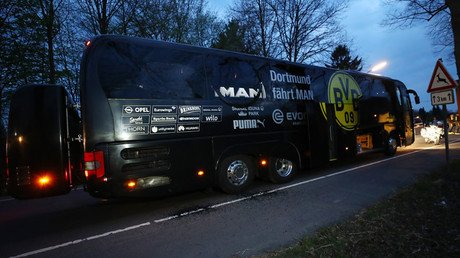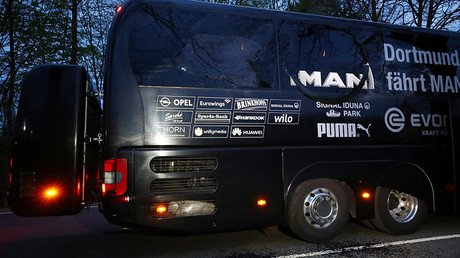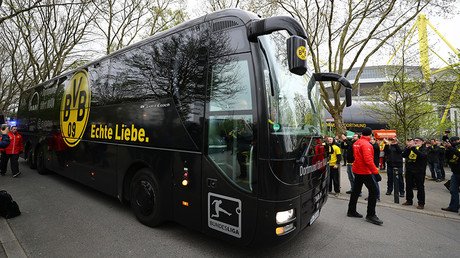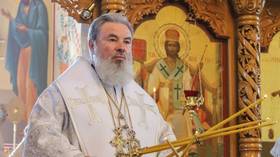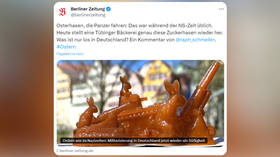Dortmund bus bomb suspect arrested, planned share price scam – prosecutors
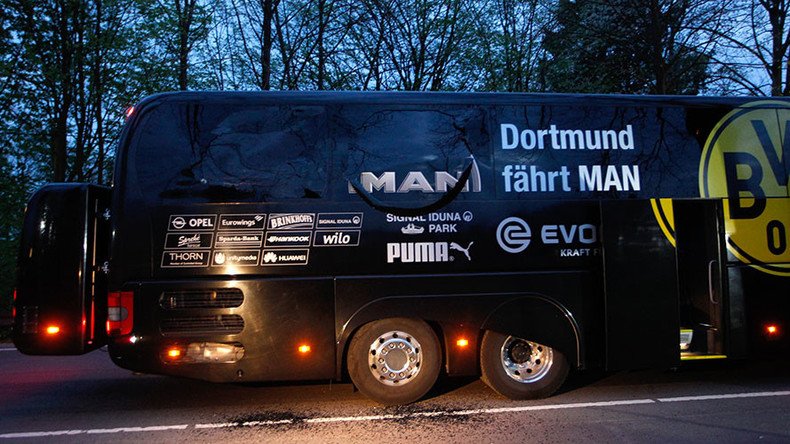
German police have arrested a man suspected of carrying out the Borussia Dortmund bus bombing. The German-Russian man was reportedly planning a financial scam with the football club's market shares and had no links to terrorist groups.
The 28-year-old suspect was arrested by the German GSG 9 elite counter-terrorist unit on Friday morning, near the university town of Tubingen, the Federal Prosecutor’s Office (GBA) confirmed in a statement.
The man, identified in local media as German-Russian dual citizen Sergey W., was charged with attempted murder as well as inflicting serious bodily harm through the use of explosives.
Financial motives are now thought to have been behind the triple bombing on the Borussia Dortmund football team last week, which happened as the team made its way to its home stadium for the Champions League quarter-final match against French team Monaco.
The prosecutor’s office says Sergey W. had bought 15,000 shares in the club just before the bombing, and planned to speculate on them if the stock price plummeted.
The so-called ‘put options’ he bought would have allowed him to sell the shares at a pre-determined price, entitling him to as much as $4.3 million (€4 million) if their value fell, according to Bild.
The investigators also say the man bought the shares while staying in L’Arrivee hotel – where Dortmund players were staying before their match – citing examination of his IP address.
He was also booked into the same hotel during the day of the attack, and his room overlooked the street where the explosions hit the bus. The blast injured Dortmund player Marc Bartra and a police officer. The GBA’s statement said that the bus had no armored protection or bulletproof windows.
Speaking at a news conference later on Friday, GBA spokesperson Frauke Koehler said that searches had taken place in four different cities, though investigators had found no evidence that the suspect had an accomplice.
Police had also found various communication devices in the suspect's apartment, she said, adding that the explosives he had used left “minimal residue,” which complicates any further investigation.
Citing its own sources, Germany’s Der Spiegel weekly reported that the suspect was conscripted into the German Army and served between April and December 2008.
However, the outlet says that it’s still unclear where the suspect learnt how to handle explosives, as he actually served in a medical regiment in the town of Dornstadt, where he was responsible for electrical maintenance engineering.
Earlier reports suggested the explosives used in the attacks could have come from the German military. The investigators have not confirmed this, however, saying they have no “exact data” on the nature of the explosives.
A spokesman for the Russian embassy in Germany, Denis Mikerin, said the mission is verifying the suspect’s Russian citizenship.
“At the moment, we are checking whether or not he is a Russian citizen,” Mikerin said, as cited by RIA Novosti. “If confirmed, our consulate is ready to render necessary support to him.”
The spokesman added that the suspect had not contacted the Russian consulate in Bonn.
It is yet to be established if the explosive devices used in the attack, packed with nails to increase the effect, were detonated remotely from inside the hotel. It is reportedly likely that Sergey W. stayed at the L’Arrivee even after the blast.
Following the explosion, which caused panic and chaos among terrified hotel guests, the suspect went to the L'Arrivee restaurant and ordered a steak, Bild reported.
Previously, the investigation struggled to establish a motive behind the attack.
Three identical letters full of threats “in the name of Allah” were found at the scene, but their wording made investigators suspicious.
“The letters were full of contradictions and inconsistencies,” the GBA’s statement said, adding that “there is considerable doubt about radical Islamists [being involved in the attack].”
Another letter claiming responsibility for the attack was posted online, first thought to have been composed by German left-wing activists, but was later discounted by police as well.
Earlier, a 26-year-old Iraqi national, identified as Abdul Beset A., was detained in alleged connection with the Dortmund attack. The prosecutor's office noted that investigators had produced “no evidence” of the suspect’s direct involvement in the blast. However, it is suspected that Abdul Beset A., who joined Islamic State (IS, formerly ISIS/ISIL) in late 2014 in Iraq, led a unit of 10 militants whose task was “to prepare and execute abductions, extortions and killings.”
